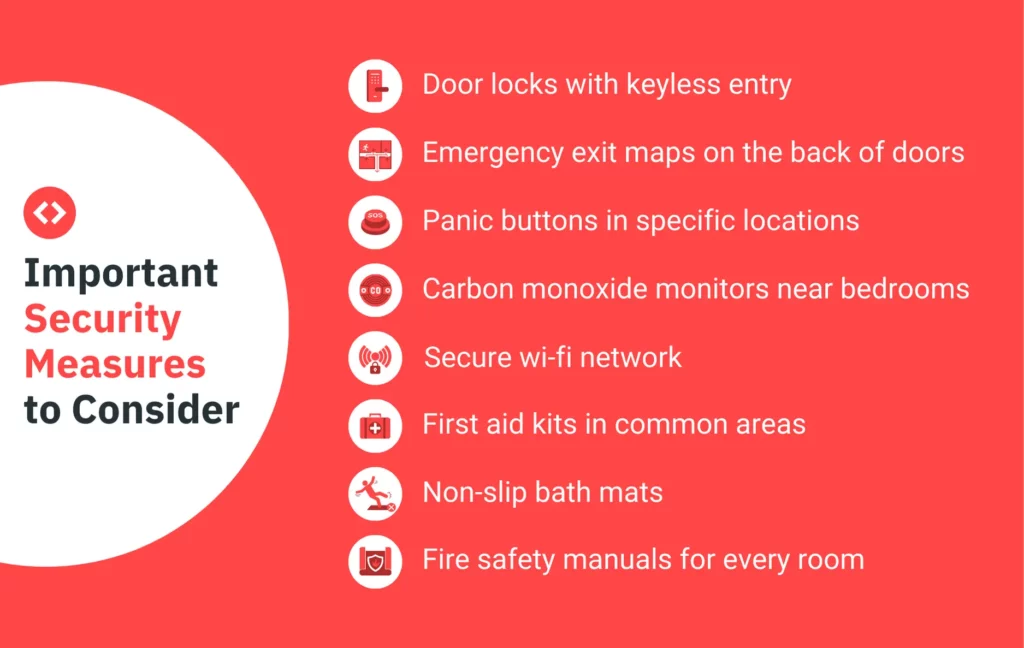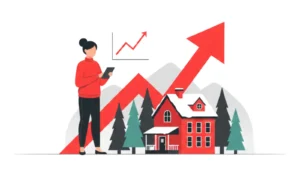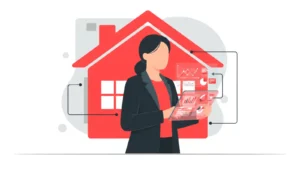Table of Contents
Updated : Feb 9, 2025
Luxurious amenities like pools, gyms, outdoor fire pits, and personalized touches surely improve a guest’s stay. However, no amount of luxury can compensate for the basics, which is the cornerstone of a great stay.
Since 48% of guests leave a review after a negative experience, the last thing you want is a bad review because of overlooked basics like fire safety or faulty entry systems.
That’s why ensuring property safety always takes precedence over luxury. Plus, it helps keep your basic property management KPIs in check.
To help you prioritize safety, we’ve compiled five straightforward vacation rental security tips for your property.
1. Invest in High-Quality Security Systems
Keyless entry offers both security and convenience for your property. By eliminating traditional keys, you prevent the risk of previous guests or staff making unauthorized copies. Opt for smart locks that generate unique codes for each guest and connect to your Property Management System (PMS) for seamless automation. Plus, contactless check-ins enhance guest satisfaction while adding another layer of safety. This also improves security and eliminates incidents due to lost or copied keys by nearly 40%.
You also need to install high-end security systems to safeguard your guests and your rental from potential harm caused by varied circumstances. The points mentioned below are some safety measures you should have in place in your vacation rental.

2. Invest in Vacation Rental Insurance
Accidents can happen anytime, no matter how many precautions you take. Having comprehensive vacation rental insurance is your safety net, protecting you from financial losses while ensuring your guests feel secure during their stay. Without the right insurance, property managers can face hefty repair bills, legal fees, or even loss of business due to unresolved disputes with guests or homeowners. Investing in a comprehensive policy safeguards your property, protects your reputation, and fosters trust with your guests. Here’s what to look for in a policy:
- Bodily Harm to Guests: If a guest slips, falls, or suffers any injury while staying at your property, liability coverage ensures that medical expenses and potential legal costs are covered. This protection is essential for properties with features like pools, hot tubs, or staircases.
- Structural Damage to the Property: Natural disasters, fires, or even accidental damage caused by guests can result in costly repairs. A robust insurance policy should include coverage for structural damage to protect your investment.
- Damage to the Property’s Contents: From broken furniture to damaged appliances, covering the contents of your property ensures that wear and tear or accidents don’t result in significant out-of-pocket expenses.
Additional Considerations:
- Comprehensive Coverage: Look for a policy that protects all stakeholders, including property managers, homeowners, and guests. This all-encompassing coverage minimizes disputes and ensures everyone involved has peace of mind.
- Simple Claims Process: Accidents are stressful enough—your insurance process shouldn’t add to the burden. Choose an insurer with a quick and straightforward claims procedure, so you’re reimbursed promptly. Aim for providers that guarantee payouts within a few days of filing a claim.
- Tailored Policies: Not all properties are the same, so your insurance should reflect your unique needs. For example, homes in hurricane-prone areas may require additional coverage for wind or flood damage.
- Guest-Protection Features: Some insurance providers offer advanced guest screening tools as part of their services. These can prevent risky bookings, reducing the chances of damage or incidents altogether.
3. Verify your Guests
This builds on the first point, emphasizing that digital verification is just as necessary as physical security.
Request government-issued identification or use vacation rental platforms with built-in ID verification features. Pair this with pre-arrival communication with guests to confirm the purpose of the stay and address any concerns upfront. This step adds that extra layer of verification and goes a long way in creating a secure rental experience for everyone.
If you’re using a booking platform, verify guest identities to avoid fraudulent bookings or untrustworthy guests. Most platforms, like Airbnb and Vrbo, provide features that allow you to check a guest’s profile and their reviews and even verify their government-issued IDs.
For direct bookings, you can create custom verification processes. Whether it’s through additional ID checks or personalized communication, this approach further ensures that you host only reliable, trustworthy guests.
Use PriceLabs Market Dashboard To Know Guest Preferences
With PriceLabs Market Dashboard, understand what amenities your guests prefer and communicate them effectively for enhanced guest experience.
Try For Free Now!4. Ensure Regular Compliance with all Vacation Rental Safety Standards
Stay up-to-date with local safety regulations and implement the highest safety standards with regular inspections.
Here’s how:
- Regularly review and maintain your property’s local compliance rules
- Conduct routine structural inspections to check walls, roofing, etc., and address potential hazards before they get severe
- Ensure regular disinfections on high-touch surfaces like switches, doorknobs, etc. to reduce the spread of germs.
Moreover, refer to platform-specific safety guidelines and consider downloading the vacation rental safety tip sheet from the National Fire Protection Association (NFPA) for a robust security system.
5. Build Effective Communication with your Guests for a Smooth Rental Experience
Clear communication is key to ensuring your guests’ safety. Before check-in, inform them about who will be accessing the property (if anyone), like maintenance or cleaning staff, and confirm that no one else is authorized to visit. This step helps guests feel secure and reduces the chances of them allowing access to unauthorized individuals. Here are a few things you can inform your guest beforehand:
- Provide guests with detailed check-in information, property rules, and recommendations for nearby attractions or restaurants to improve their stay.
- Address guests’ concerns or questions during their stay to ensure they feel valued and cared for.
- Encourage guests to share feedback after their stay to secure future bookings.

6. Tie Up with Local Resources For Enhanced Vacation Rental Safety
Collaborating with local resources is an often-overlooked but highly effective way to ensure the safety and security of your vacation rental property. Building relationships with professionals in your area not only enhances guest safety but also makes your property management more efficient and stress-free. Here’s how to make the most of local partnerships:
- Partner with Emergency Services: Reach out to local police, fire departments, and emergency medical services to understand the specific safety protocols in your area. Many local departments offer safety checks or fire prevention consultations for homes. Having their contact details readily available in your welcome guide ensures guests know who to call in case of an emergency.
- Work with Certified Inspectors: Collaborate with certified home safety inspectors to regularly evaluate your property. These experts can identify potential hazards, such as faulty wiring, unsafe staircases, or outdated safety equipment, ensuring your rental is always up to code.
- Team Up with Local Repair Services: Establish relationships with trusted handymen, electricians, plumbers, and HVAC specialists in your area. Quick response times from local professionals can mitigate issues, whether a leaking faucet or a sudden power outage, before they escalate. Bonus: You’ll save time vetting service providers when problems arise.
- Engage with Local Security Firms: Consider hiring a local security firm to monitor your property or install and maintain security systems. From surveillance cameras to alarm systems, professional oversight can ensure that your property and guests are protected against theft or vandalism.
- Collaborate with Health Professionals: Partner with local pharmacies or medical professionals to create an emergency health plan for your property. Ensure your first aid kit has region-specific essentials (e.g., allergy medications for areas prone to high pollen counts). Consider offering a list of nearby clinics or hospitals in your guest handbook.
- Work with Disaster Preparedness Experts: For properties located in areas prone to natural disasters like hurricanes, wildfires, or earthquakes, team up with local disaster preparedness organizations. These experts can guide you on setting up evacuation plans, assembling emergency kits, and educating guests on what to do during an emergency.
7. Conduct Regular Safety Inspections
Safety measures are only effective if maintained over time. Schedule bi-annual safety checks to identify potential risks like loose railings, worn-out smoke detectors, or fire extinguishers past their expiration date. After extreme weather conditions, conduct additional inspections to ensure your property remains secure and hazard-free. Document these inspections to protect yourself against potential disputes or false claims.
Follow These Vacation Rental Security Tips to Secure Your Guests
The article underscores the importance of security as the foundation for a memorable guest experience. So, follow these vacation rental security tips to maintain a safe environment:
- Invest in high-quality security systems
- Invest in Vacation Rental Insurance
- Verify guest identities
- Ensure regular compliance with safety standards
- Build strong communication with guests
- Partner with local resources for added protection
- Conduct Regular Safety Inspections
Prioritize security with these tips and create a trustworthy, safe environment that keeps your guests returning!







